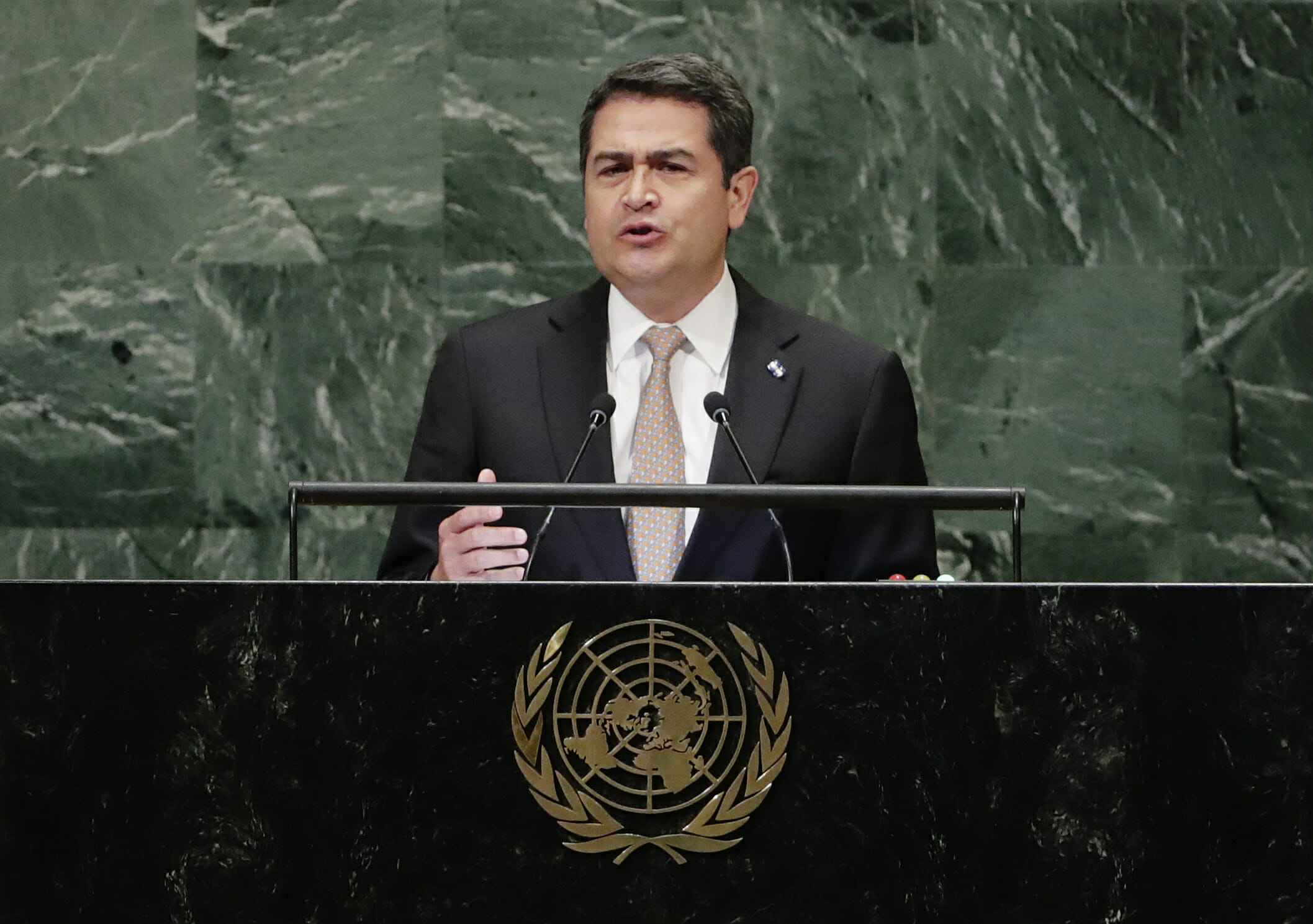
Honduras president, others targets of DEA investigation
NEW YORK (AP) — U.S. federal court documents show Honduran President Juan Orlando Hernández and some of his closest advisers were among the targets of a Drug Enforcement Administration investigation.
A document filed by prosecutors on Tuesday in the Southern District of New York mentions Hernández as part of a group of individuals investigated by the DEA since about 2013 for participating “in large-scale drug-trafficking and money laundering activities relating to the importation of cocaine into the United States”.
Hernández was elected president of Honduras in late 2013.
The document is a July 2015 application to the court to compel Apple, Google, Microsoft, Yahoo and AOL to give investigators email header information, but not emails’ content, for a number of accounts. Two of the accounts are believed to be of Hernández, the documents says.
There is no indication charges have been brought against Hernández.
Also included in the request are the email accounts of the president’s sister Hilda Hernández, his adviser Ebal Díaz and his security minister Julián Pacheco Tinoco. Hilda Hernández, who helped manage the finances of the president’s political party and his presidential campaign, died in a December 2015 helicopter crash. The request also named four members of the wealthy and politically-connected Rosenthal family.
Yani Rosenthal, a former national lawmaker and presidential candidate, pleaded guilty in U.S. federal court in 2017 for money laundering for the Cachiros drug trafficking organization.
The new court filing is part of the pre-trial motions in the case of Hernandez’s brother Juan Antonio “Tony” Hernández, who was arrested in 2018 in Miami and accused of scheming for years to bring tons of cocaine into the country. His trial is expected to start in September.
A spokesman for the Southern District of New York said on Thursday the court’s response to the application for email header information is not public information. He declined to comment further.
The document filed Tuesday raises the possibility that the DEA has email data for Honduras’ president and members of his inner circle dating to 2015.
Messages left for Díaz, who is Hernández’s de facto spokesman, were not immediately returned. Pacheco could not be immediately reached, but the government has previously denied allegations against him.
Pacheco has been dogged by allegations of his links to drug traffickers since at least 2017 when a leader of Honduras’ Cachiros cartel testified in another case in New York about his ties to drug traffickers.
Pacheco had served under Hernández’s predecessor, Porfirio “Pepe” Lobo Sosa, as the government’s chief of investigation and intelligence. Lobo’s son Fabio was sentenced to 24 years in a U.S. prison in 2017 for drug trafficking.
In another document filed Tuesday in Tony Hernández’s case, prosecutors said “the charges against the defendant arise out of a long-term investigation of politically connected drug trafficking in Honduras” that began in 2013.
On Thursday, a DEA spokeswoman referred questions asked by The Associated Press to the Southern District of New York.
The U.S. government has been a staunch supporter of Hernández’s government, pouring millions of dollars into security cooperation because Honduras is a key transshipment point for cocaine headed to the U.S. from South America.
Hernández had especially curried favor with Gen. John Kelly who had led the U.S. military’s Southern Command and later became President Donald Trump’s chief of staff. Kelly advocated for continued U.S. support of Hernández’s government, noting their contributions to the war on drugs and progress in combatting corruption.
When Hernández’s already controversial re-election was marred by irregularities in late 2017, the U.S. government congratulated him while the opposition was still contesting the vote count.
With Hondurans filling the ranks of several large migrant caravans during the past year, the U.S. has continued to support Hernández while pressuring his government to stem the immigration flow.
Many Honduran migrants encountered making the journey to the U.S. border during the past year have referenced government corruption among their reasons for leaving. Thousands of doctors and teachers have been marching through the streets of Honduras’ capital for three weeks against presidential decrees they say would lead to massive public sector layoffs. On Thursday, a massive march led to clashes with police who fired tear gas against some protesters’ rocks.
Retired history professor Dana Frank, whose recent book “The Long Honduran Night: Resistance, Terror, and the United States in the Aftermath of the Coup” details the country’s recent political turmoil said the documents confirm the U.S. government has known about drug trafficking activities linked to Hernández for years.
“Why have U.S. officials — from the State Department to the White House to the Southern Command — continued for years now to celebrate, and pour security funding into, a government whose very topmost officials and security figures it has known were drug traffickers?” Frank said. “This evidence underscores the vast hypocrisy of U.S. policy, which backs a known drug trafficker and his police and military cronies, while claiming to do so in the name of fighting crime and drugs.”
____________
Torrens reported from New York and Sherman from Mexico City. Associated Press Martha Mendoza contributed to this report from San Jose.
The Western Journal has not reviewed this Associated Press story prior to publication. Therefore, it may contain editorial bias or may in some other way not meet our normal editorial standards. It is provided to our readers as a service from The Western Journal.
Truth and Accuracy
We are committed to truth and accuracy in all of our journalism. Read our editorial standards.
Advertise with The Western Journal and reach millions of highly engaged readers, while supporting our work. Advertise Today.












